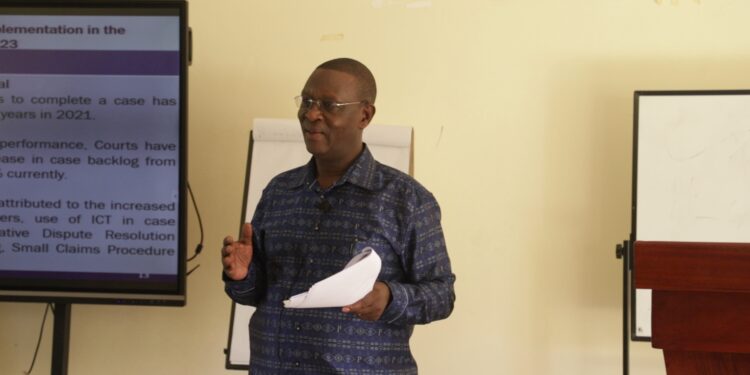The Permanent Secretary to the Judiciary, Pius Bigirimana has delivered an emphatic endorsement of the Electronic Court Case Management Information System- ECCMIS initiative, casting it as a formidable solution to the persistent issue of case backlog within Ugandan courts.
Speaking with unwavering conviction on August 24th, 2023, Bigirimana lauded the initiative’s resounding success in tackling the mounting caseload that has long burdened the nation’s legal system.
The grand stage for this acclaim was set at the National Leadership Institute (NALI) in Kyankwanzi, where local government leaders from the central region of Uganda had convened for an insightful retreat.
During the 4-day retreat, multiple officials from government ministries, departments, and agencies (MDAs) were extended invitations to present the diverse accomplishments of the NRM 2021/26 manifesto.
These presentations were directed at local government leaders, aiming to equip them with the information needed to communicate the government’s progress to their respective electorates.
In light of this context, PS Bigirimana, representing the Judiciary, delivered an insightful presentation highlighting the fulfillment of the judiciary’s five manifesto commitments.
Addressing the challenge of case backlog, the establishment of ECCMIS and the integration of video conferencing facilities were crucial aspects emphasized in his presentation.
Bigirimana noted, “The ECCMIS initiative is poised to enhance flexibility and convenience in court processes, minimize paperwork, and expedite criminal case proceedings. This is evident in the daily hearings of criminal cases in Kampala’s judiciary. We are committed to maintaining this practice.”
Furthermore, he disclosed the judiciary’s ongoing efforts to augment the number of support staff, aiding judicial officers in their duties.
This endeavor, also aimed at reducing case backlog, focuses on both judicial and non-judicial staff categories.
Bigirimana shared, “The non-judicial staff plays a pivotal role in supporting judicial personnel in their adjudicative tasks. These include court clerks, process servers, drivers, secretaries, and office messengers. Cabinet approval has been secured for the establishment and structure of this non-judicial support staff.”
He also highlighted the significant contribution of videoconferencing facilities in addressing case backlog. He noted, “Our goal was to cover all high court circuits, and I am pleased to report that we’ve achieved nearly 80% coverage, including the Supreme Court and the Court of Appeal.”
What does ECCMIS stand for?
ECCMIS, which stands for Electronic Court Case Management Information System, is a comprehensive system designed to automate and monitor every stage of a case’s life cycle, ranging from the initial filing to the final disposition and appeal, for all types of cases involving individual parties.
The foundation of ECCMIS lies in the Judiciary’s business rules engine, which minimizes the need for human intervention.
The system boasts the capability to streamline and ensure the efficient collection, organization, distribution, and retrieval of substantial case-specific data. Additionally, it facilitates the processing of payments related to court fees and fines.
Furthermore, ECCMIS is equipped to generate reports from the system, offering valuable insights to aid in decision-making processes.
Key Features of ECCMIS:
E-filing: ECCMIS introduces a public portal enabling users to electronically submit documents while accessing case-related information across various jurisdictions and case types. Lawyers will benefit from the ability to electronically file case documents, effectively reducing the administrative load on the court system.
E-payment: The system facilitates online payment of fines, filing fees, and transactions involving bail and deposits. Payment options encompass mobile money, Visa, EFT, and other alternatives.
Mobile Phone Accessibility: Litigants can conveniently check the status of their cases via mobile phones and Short Messaging Services (SMS). Through a USSD, individuals involved can easily access and monitor all cases.
E-Processing (Online Case Management): ECCMIS promotes paperless case management from the moment a case is filed, carrying through the entire case life cycle. This includes stages such as mediation, automated case allocation, hearings, judgment delivery, execution, case closure, and eventual archiving within the system.
Reporting and Analytics: ECCMIS offers a user-friendly reporting system that allows for precise reporting in diverse formats including lists, reports, cascades, charts, and bubbles. The reporting process is simplified through drag-and-drop functionality.
As the retreat drew to a close, the echoes of his words lingered, a reminder that through initiatives like ECCMIS, Uganda’s judicial system marches boldly towards a future characterized by timeliness, fairness, and renewed trust in the dispensation of justice.
Do you have a story in your community or an opinion to share with us: Email us at editorial@watchdoguganda.com













